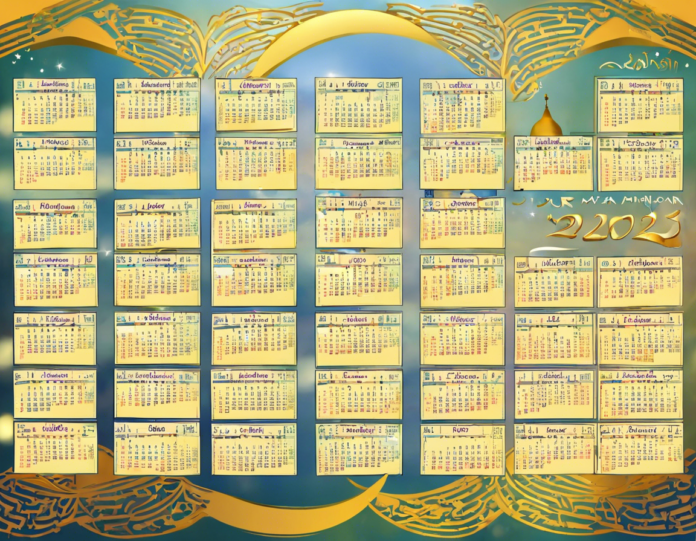Ramadan is the ninth month of the Islamic lunar calendar and is considered the holiest month for Muslims worldwide. During this sacred month, Muslims fast from dawn until sunset, engage in increased prayer and worship, and focus on self-reflection, spirituality, and community. The exact dates of Ramadan vary each year due to the Islamic lunar calendar being 10 to 12 days shorter than the Gregorian calendar. In 2023, Ramadan is expected to begin on the evening of Saturday, March 25th, and end on the evening of Sunday, April 23rd. This Ramadan calendar will provide a guide to the important dates and schedule for 2023:
Important Dates:
1. March 25th, 2023 – Ramadan Begins:
- The first day of fasting and the commencement of the holy month of Ramadan.
2. April 11th, 2023 – Laylat al-Qadr:
- Also known as the Night of Decree or Night of Power, it is believed to be the night when the Quran was first revealed to Prophet Muhammad (peace be upon him).
3. April 23rd, 2023 – Eid al-Fitr:
- The festival of breaking the fast, which marks the end of Ramadan. It begins with the sighting of the new moon, and Muslims celebrate with prayers, feasting, and giving of gifts.
Daily Schedule During Ramadan:
- Suhoor (Pre-Dawn Meal):
-
This meal is consumed before the Fajr (dawn) prayer and the start of the fast. It is recommended to have a balanced meal that provides energy for the day ahead.
-
Fajr (Dawn Prayer):
-
The first prayer of the day before fasting begins. It is essential to offer this prayer before the time for fasting starts.
-
Fasting Hours:
-
From dawn until sunset, Muslims abstain from food, drink, smoking, and intimate relations. It is a time of self-discipline, restraint, and spiritual reflection.
-
Iftar (Breaking the Fast):
-
At sunset, the fast is broken with dates and water, followed by the Maghrib prayer. This is followed by a meal known as Iftar, which is shared with family and friends.
-
Taraweeh Prayers:
-
These are additional prayers performed at night during Ramadan. They are Sunnah prayers and are usually held in congregation at mosques after the Isha prayer.
-
Reading the Quran:
- Many Muslims aim to complete the recitation of the Quran during Ramadan. Reading and reflecting on the Quran is a common practice during this month.
Tips for a Healthy and Spiritual Ramadan:
- Stay Hydrated: Drink plenty of water during the non-fasting hours to avoid dehydration.
- Eat Balanced Meals: Include fruits, vegetables, protein, and complex carbohydrates in your Suhoor and Iftar meals.
- Give to Charity: Ramadan is a time for generosity and giving to those in need.
- Maintain Regular Exercise: Engage in light physical activity to maintain energy levels.
- Focus on Worship: Increase your prayers, Quran recitation, and acts of kindness during Ramadan.
Frequently Asked Questions (FAQs):
1. Can pregnant or nursing women fast during Ramadan?
- Pregnant or nursing women are exempt from fasting if it poses a risk to their health or the health of their child. They can choose to fast at a later date or feed a needy person for each day missed.
2. Are children required to fast during Ramadan?
- Fasting is not obligatory for children who have not reached puberty. However, some children may choose to participate in fasting for a few hours to practice and build up their tolerance.
3. What is the significance of Laylat al-Qadr?
- Laylat al-Qadr is considered the most auspicious night of the year, during which prayers are believed to be multiplied in reward. Muslims seek this night in the odd-numbered last ten nights of Ramadan, particularly on the 27th night.
4. How is Eid al-Fitr celebrated?
- Eid al-Fitr begins with a special prayer at the mosque, followed by a sermon. Muslims then visit friends and family, share meals, exchange gifts, and engage in acts of charity.
5. Can travelers fast during Ramadan?
- Travelers are allowed to postpone their fasting and make it up later, especially if traveling long distances. However, if fasting is not burdensome, they may choose to observe it during travel.
6. Is it permissible to brush teeth while fasting?
- Yes, it is permissible to brush teeth and use a miswak (a teeth cleaning twig) while fasting as long as one avoids swallowing toothpaste or water during the process.
7. How can one make the most of Ramadan spiritually?
- Engage in additional acts of worship such as night prayers (Tahajjud), Quran recitation, seeking forgiveness, making du’a (supplication), and increasing acts of kindness and charity.
8. What is the ruling on taking medication during fasting?
- Those who are ill or have a medical condition requiring medication are allowed to take their medication while fasting. However, it is advisable to consult with a knowledgeable person if unsure.
9. Can non-Muslims participate in Ramadan activities?
- Non-Muslims are welcome to participate in Ramadan activities such as Iftar gatherings, community service projects, and cultural events. It is an excellent opportunity to learn about different traditions and foster interfaith understanding.
10. How can one maintain focus and motivation throughout Ramadan?
- Set clear goals for the month, create a routine that includes time for worship and reflection, seek the company of righteous people, avoid distractions, and constantly remind yourself of the purpose and blessings of Ramadan.
In conclusion, the 2023 Ramadan calendar offers a guide to the important dates, schedule, and practices during this auspicious month. Muslims around the world look forward to the spiritual rewards, communal bonds, and personal growth that accompany the observance of Ramadan. May this sacred month bring blessings, peace, and spiritual fulfillment to all those who observe it.




